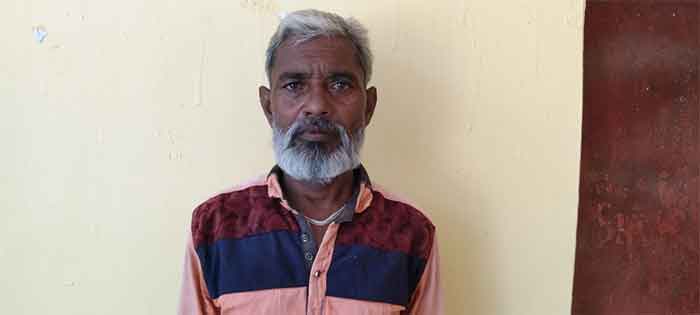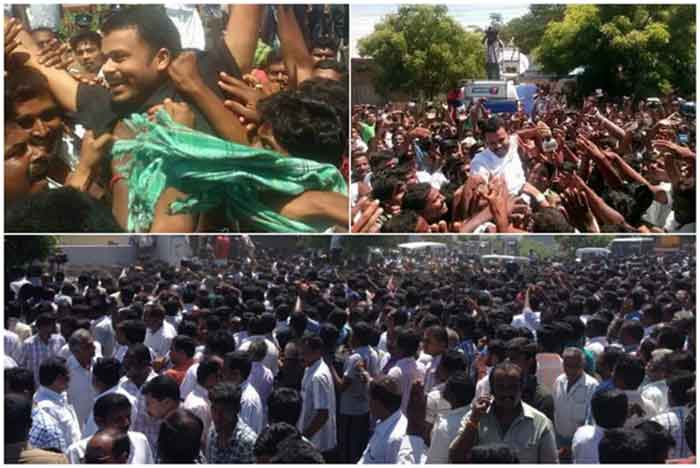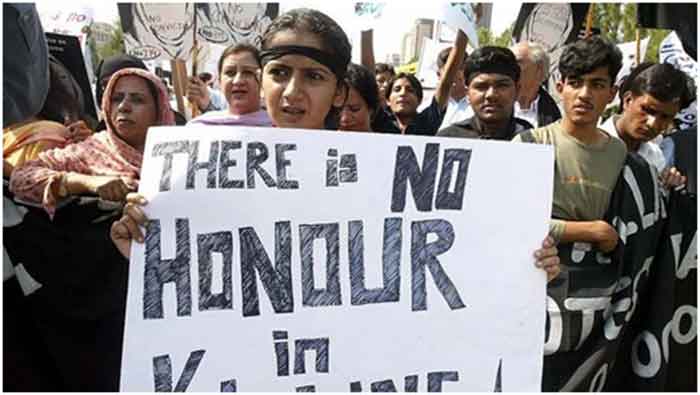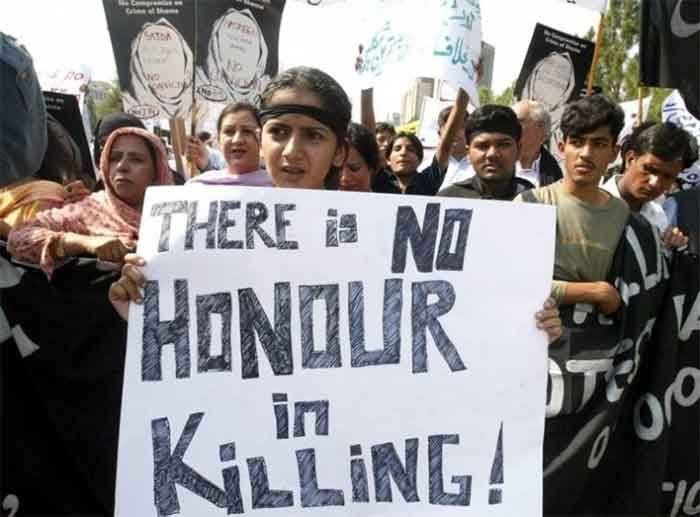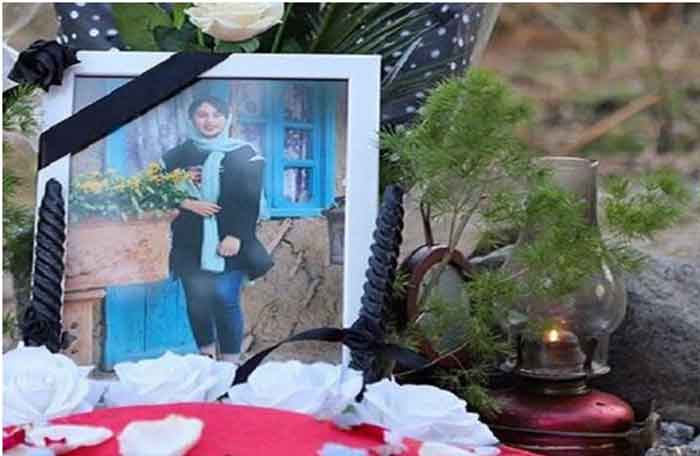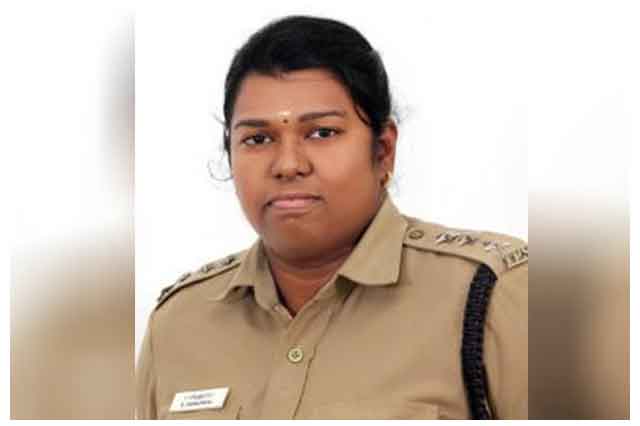
Vishnupriya (in the photo), aged 27, a woman police officer of DSP rank, dalit by birth, was found hanging at her official residence in Tiruchengode (Tamilnadu) on 18th September 2015. She was a single woman and was the Investigating officer (IO) in the sensational Gokulraj (dalit-born) murder case, discussed earlier in the series.
This incident of suicide of this DSP, IO, speaks volumes but even that is sought to be buried by all (un-) concerned.
We look into some facts of her suicide, and then see the socio-political environment in Tamilnadu which led to her suicide.
This is part-2 of an article, and part of a larger series on Tamilnadu.
See part-1 : Tamilnadu’s Caste mafia has deep roots and thrives by patronage of ruling parties, published on March 26,2022.
300 SC/ST persons were murdered between 2016 and 2020 in Tamil Nadu, with only 13 convictions, says a report,compiled by adding up RTI data from 35 of the 38 districts in the state. Perhaps that is the highest for a single Indian state in such a short period.
But this fact is systematically covered up by the Tamilnadu’s govt and its polity. That is not highlighted by Tamilnadu’s media either. Big media sees no big news in that. There are many Ambedkarites, as elsewhere, and Periyarists who are part of Tamilnadu’s establishment, who do not press the issues involved.
This series seeks to throw light, and focus the issues outside Tamilnadu also.
*** ***
Suicide, if so why? Many are not convinced by CBI report
Even six years after her death in 2015, many are not convinced.
In April 2018, the CBI had filed a closure report ruling out any larger conspiracy behind Vishnupriya’s suicide. However, the Coimbatore Chief Judicial Magistrate’s court had ordered further investigation into the case after her parents alleged that she, a Deputy Superintendent of Police was harassed and ill-treated by the then Superintendent of Police of Namakkal District. Then CBI was forced to probe again.
After investigating her suicide case for the second time, over three years, the Central Bureau of Investigation (CBI) in September, 2019, reiterated its earlier conclusion that the police officer ‘was not abetted to take her own life’. But no reasons of suicide were reported. As per the CBI, Vishnupriya reportedly left a suicide note saying that her decision had nothing to do with the Gokulraj murder case, and she took the extreme step due to personal reasons.
Despite investigations by CBI twice, after one by TN CB-CID, her father Ravi Kumar who had worked in police department, was not convinced, and filed a petition to re-investigate the case. However, the court dismissed the petition. (dtnext.in report, Coimbatore, Jan 10,2020): The CBI closed the file during AIADMK rule. Ravi Kumar told the media that he would move the High court against the closure of the case. “I will fight until I get justice for my daughter’s death,” he said.
We have seen in part-1 that before killing Gokulraj, the accused coerced him to record a video and write a suicide note, police had said. Ultimately, it was proved to be a murder, and the culprits were convicted. The suicide note by the DSP was likewise not trusted by many including her parents and close colleagues.
thefederal.com had reported on Sep 20,2019:
“Clarifying on her parents’ allegations that Vishnupriya committed suicide because of being harassed by a senior officer, the CBI said in its report that mere scolding or instructions from higher officials cannot be regard ed as an offence under Section 306 (abetment to suicide) of the Indian Penal Code.”
A copy of the report is available with The Federal, it said. The above lines in fact show Vishnupriya was indeed under pressure. So the family and friends were not convinced. The VCK had earlier said, while seeking a CBI enquiry :
“The larger issue here is the condition of Dalit women in the police force. Most officers are from upper castes, and they don’t treat lady officers from SC groups properly,” says Thirumavalavan, “there have been several cases of Dalit women leaving the force at police-constable level itself.”
Thirumavalavan was not merely a state-level legislator; he is now an elected Member of Parliament. He is a dalit-born, renowned scholar-activist, author, founder-leader of VCK, Vidudalai Chirutaigal Katchi (Liberation Panthers Party), a criminologist, and a doctorate.
He is not alone in his assessment. Sudha Ramalingam, a feminist activist, and senior advocate based in Chennai, says:
“I have seen several cases in my career where policewomen have been harassed and assaulted, and they speak of this only with the caveat that I cannot speak about it to anyone else. One constable once told me how they fear even asking for help for themselves. Higher officers have so much clout, and they are rude and inhuman to woman officers, especially those down the order.”
For full report visit:
Frontline, (October 16, 2015) had also featured news stories on the subject.
*** ***
‘DSP Vishnupriya’s death, caste-tinderbox in TN, and the horrors of being a lady officer’
thenewsminute.com, TNM, a web magazine, carried several detailed and specific reports over the years. On September 19, 2015 it reported her death with the above caption.
Vishnupriya was the IO in that case, and was under severe pressures from various forces including within the police hierarchy. She died on Sep18th, and the murder case as well as her own death became more mysterious. She was on duty, handling an agitation by teachers, the same afternoon, and told her driver to come by 5.30pm. Something happened in between and she was found dead. The call list of those hours was crucial, it was said.
Vishnupriya’s father, N Ravi Kumar, had also worked in police department, and was under pressure to save the ‘prestige’ of the department, as is common in such cases. He defied pressures and later filed a case that led to the Coimbatore CJM’s court order for further investigation.
Gokulraj (born SC), the 21-year old engineering college student was forcefully abducted, despite his protests, by a gang that came (posing as policemen, as per one report) to the temple where he was found with a girl friend. The next day, June 24, 2015, his headless body was found on the railway track near a village in Namakkal district. Since her son did not come home from college, his mother Chitra lodged a complaint on June 23, itself.
These incidents led to widespread protests across the State, finally forcing the then All India Anna Dravida Munnetra Kazhagam (AIADMK) government led by Jayalalithaa to order a State Crime Branch-Criminal Investigation Department inquiry on September 21, 2015, later by CBI.
The suicide note
The TNM, report opens with these lines:
“Beyond the conspiracy theories and speculation, the case is an illustration of what it really means to be a young lady police officer from a lower caste in Tamil Nadu.”
It cites a 7-page suicide note that reportedly said that ‘her decision has nothing to do with the ‘sensitive case’, but mentions her job, and what was on her hands at the time.
Excerpts from the report, self-explanatory, are given below:
“I am the IO of a sensitive case. Please don’t relate my death to the case…“ She says that she likes her job, it is like ‘god’, but she feels she is not suitable for the job. “MADE A MISTAKE,” she writes, “that guilt is troubling me a lot.”
She writes, “Don’t give the police any trouble… don’t go to any political party… take my body and leave silently.” Don’t seek compensation, she pleads. “Nobody has done anything to me, you know they cannot..,”
“ She asks the media not to ‘create stories’…But in spite of the letter, that’s exactly what’s happening today…”
*** ***
“I know I might lose my job because of this, but I don’t care anymore,” says a fellow woman police officer
“ Her batch-mate, close friend and fellow police officer in another district, Maheshwari – perhaps the ‘Mahesh akka’ she mentions in her letter – is livid. Speaking to the media, she says that it is indeed the Gokulraj murder case because of which she took her life.
“She was a bold and honest officer. The Gokulraj case was not investigated properly at all. The case is the cause for her suicide. I know I might lose my job because of this, but I don’t care anymore,” said Maheshwari, adding that “The SPs and DSPs in the case were pressurizing her to put Goondas Act on those unrelated to the murder since their remand period was coming to an end.”
Maheshwari says that as lady officers, the pressure on them is immense. “They don’t speak to us properly, they misbehave with us. We do fear as to what they can do to us, and they are capable of doing it,” says Maheshwari.
“ There have been source-based media reports too, which state that before she was found hanging, officers were trying to reach her regarding a Goondas Act case.
“ Activists and politicians have stepped in too.
“ Stalin Rajangam, a social activist who was a part of a fact-finding mission in the Gokulraj case, had met DSP Vishnupriya a week after the murder.
“She was hesitant in sharing information with us, she told us that officers higher up will not like it if she shares all details.” He agrees that there is no proof yet linking the suicide with the murder, but there was pressure on her over the investigation, he says.
“ Gokulraj’s mother, Chitra, too says that the murder investigation could have led to her suicide, she told TV channels.
Dalit-based party VCK’s chief Thol. Thirumavalavan (former legislator) minces no words in stating that the suicide is not an open and shut case.
“Her father was a police officer. She was well educated, and knew what it meant to be in the police force. It is not easy to believe that she took her life because of the general work-pressure on her,” he says, speaking to The News Minute.
*** ***
DSP Vishnupriya Suicide: Friends, Family name officials
Theirs were not mere general doubts. They cited incidents and names.
Speaking to News7, Vishnupriya’s mother Kalaiselvi had said that it was because she was asked to wrongly book three accused in the Gokulraj case under the Goondas Act that she committed suicide.
My question is why was she not allowed to investigate the case properly? Why was there pressure from her superior officers to slap the Goondas Act on the accused? Was it to satisfy senior police officers up the chain? An audio conversation between Yuvaraj and DSP Vishnupriya which is with the Namakkal SP. In that Yuvaraj says that he is willing to surrender in her presence. Why is the SP not releasing that audio?
—Maheshwari, Vishnupriya’ s mother to The News Minute
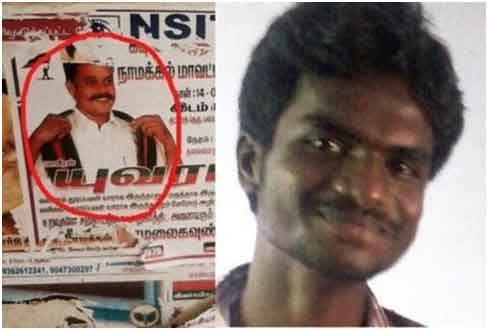
Picture of Yuvaraj, an emerging casteist OBC leader of Kongunadu, and murdered Dalit (Right) youngman Gokulraj, an Engineering graduate (Photo courtesy: The News Minute). Vishnupriya (SC) was the Investigation Officer in the case.
Yuvaraj is the main accused in the Gokulraj case and president of the caste-outfit Dheeran Chinnamalai Peravai. He was absconding from the police. M Ravi echoes Maheswari’s thought and says that the investigation must start with the Namakkal SP.
He has to be suspended, only then will the investigation be proper. He should not be in office. What happened between 3 pm and 5 pm, only he knows.
— Ravi, Vishnupriya’ s father to TNM
Amidst this, Yuvaraj, main accused in Gokulraj murder case, is said to have released a statement, blaming senior police officers for her suicide.
In his statement, circulated on messaging platforms, Yuvaraj claims that Vishnupriya was forced to arrest his friends, which is why she came under pressure.
Yuvaraj has claimed that he has hard proof of the fact that police officials were responsible for Vishnupriya’s death.
Empathising with the death of the ‘honest’ police officer, he says senior police officers including DIG Salem Vidya Kulkarni, Namakkal SP SR Senthil Kumar and two other DSPs were the cause of her death.
While allegations of pressure from senior officers are flying thick and fast, what is not clear is why exactly she was under pressure. Were senior officers trying to side with Yuvaraj and save him, or were they asking her to ramp up the pressure on friends and family of Yuvaraj to get him to surrender? Maheshwari and Ravi say that they do not know why.
Despite Vishnupriya’s letter, sources in the police department say that she was subjected to humiliation and censure from her senior officers. Namakkal SP Senthil Kumar did not respond to calls or text messages.
(Report by Ramanathan S who works with TNM, The News Minute.)
*** ***
OBC Leader Says ‘Murder of Dalit Boy is Not a Big Deal’
The above is the caption of a thequint.com report written by TNM’s co-founder
and editor Dhanya Rajendran, 14 Jul 2015, which reveals the brazen political casteism in Tamilnadu.The state police is itself riven by casteism, and works under caste and political pressures as elsewhere in India. This can be seen from the report. Ramanathan S also reported.
There are so many other such cases pending against the police for killing men from the Gounder-caste in which little or no action is being taken, Yuvaraj says.
One IG, one DIG, three SPs and scores of other inspectors are after me over this case, why are they so bothered about this case?
— Yuvaraj, Accused OBC Leader
Reassuring his fellow caste-men, and perhaps making a veiled threat, he says:
It is not that we don’t know how to put a full stop to this, it is not like we don’t have the money or muscle power to respond to the police. But I want the people to know how bad the situation is, I want people of our caste to understand the condition our community is in. We will apply for anticipatory bail in the Madras High Court soon, then we will show them who we are.
He however adds later that he has asked everyone to remain calm.
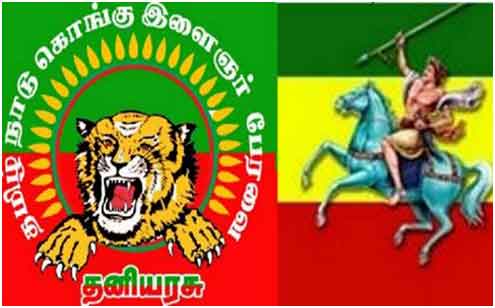
The flag of the Tamilnadu Kongu Ilaingar Peravai (Photo courtesy: The News Minute. Caste mafias are allowed to thrive, and are celebrated with a feudal mindset. Yuvaraj operated a caste-Gestapo, mainly in Kongunadu, to crack down on inter-caste marriages. Caught up in political and caste pressures, Vishnupriya committed suicide.
Kongunadu was a stronghold of AIADMK, now with its help, BJP had made a mark here in the March 2022 Municipal polls.
DMK won even here, and ADMK lost. But notably, BJP made a mark here, as it ‘was allowed by its ally ADMK, to contest alone so as to expand its electoral base’ which it did. BJP polled 12 percent votes here.
Is another variant of PMK, a brazen anti-dalit party, on the rise in this region is an ominous question being raised of late. The BJP and PMK are together in the alliance led by ADMK.
In the audio, released by Yuvaraj distributed on WhatsApp, he also says that his caste-community is more important to him than anything else. He says that he will not be moved by the emotions of family or by the power-lust of politics.
His caste chauvinism is beefed up by invoking even LTTE, which is ominously invoked to ignite all and sundry causes in Tamilnadu:
‘While fighting for the Tamils, LTTE Prabhakaran lost his entire family. This is nothing compared to that’, said Yuvaraj.
Dalit political parties and leaders said that the silence of ruling-party AIADMK in this issue is deafening.
“I am asking a political question, why are ministers in the government and AIADMK leaders not talking about this? Why are they maintaining silence?” asks Vanni Arasu, Spokesperson of the VCK, a political party seeking to protect rights of Dalits. AIADMK is known to have a strong voter-base in this region.
Vishnupriya’s death is no surprise in the given social, political and official climate of Tamilnadu, as can be seen in the following sections.
*** ***
“ There are 87 forms of untouchability and 28 forms of atrocities existing in Tamil Nadu”, says a survey.
Tamil Nadu Untouchability Eradication Front (TNUEF) President, S Sampath, speaks of a survey:
In our survey, we found out that there are 87 forms of untouchability and 28 forms of atrocities existing in Tamil Nadu.
In almost all the villages, various forms of untouchability are prevailing.
Moreover in the last three years, there have been 81 honour killings in the state.
According to NCSC, 20 percent of the population in Tamil Nadu are scheduled castes. And S Lenin Raja, President, TNUEF, South Chennai, feels that a state commission is required for such a population.
Tamil Nadu ranks high in atrocities against the SCs, with low rate of conviction
The Gokulraj murder was followed by more incidents of caste atrocities, including two other murders, of Ilavarasan and Sankar.
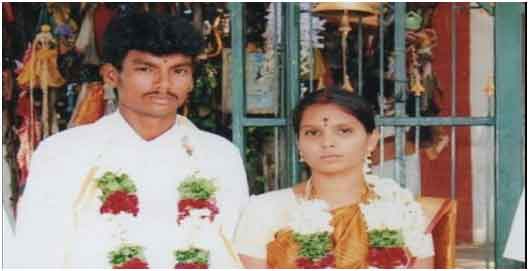
Sankar, “a Dalit who dared to marry a Thevar girl” in Periyarist Tamil Nadu, was murdered in March 2016. (Photo Courtesy: The News Minute)
Pheba Mathew reported the murder in thequint.com, 18 Mar 2016. The hopeless feeling among dalits is reflected in it:
‘Tamil Nadu is a state which prides itself on the Dravidian social justice movement, and yet it does not have a state SC Commission like other states. And this, in spite of an order from the Madras HC.’
Members of the state unit of the National Scheduled Caste Commission visited the family of the victim, Sankar, to hear the story and recommend action.
“But there is little to be expected from the well-meaning members of the NSCS. They will now send a report to their headquarters, far away in Delhi, after which the commission will recommend action. The chances of implementation of the commission’s orders are even more remote, say observers.”
The NCSC in fact had earlier made, soon after the Gokulraj murder, recommendations to the Tamil Nadu government regarding atrocities against scheduled castes. No action was taken, and Sankar was murdered. It was reported:
Tamil Nadu is one of the five states in the country that rank amongst the first five in terms of rate of atrocity committed against the Scheduled Castes. The police administration needs to be proactive to prevent the atrocities. The rate of conviction in atrocity cases is only 10 percent and is not satisfactory comparing the national average of 30 percent. Corrective steps are required to be taken by the state government to enhance the conviction rate.
Though there is no SC commission, a government department called the Adi Dravidar Welfare Department (ADWD) exists in the state, it is said.
“The functioning of Adi Dravidar department is not good. No separate commission for scheduled caste is there in the state,” says S Sampath, President of TNUEF.
‘It should be independent and judicial power should be given to it. It is our demand and we are fighting for it,’ says S Sampath, to The News Minute.
After repeated discussions, the state is still not ready to form a commission. When they speak in the Assembly also they just talk about the welfare schemes.
But when the issue of honour killing was raised in the assembly, Finance Minister O Panneerselvam said that there is no honour killing in Tamil Nadu.
Perhaps the Minister was right: In honor killings, generally, their own kith and kin are killed by culprits. But in Tamilnadu, mostly those of lower castes are killed, more so dalits, not the kith and kin.
Thus in all India official data on honor killings, as also media reports, Tamilnadu is highly under reported. (see ‘Honour killings’ in the land of ‘self-respect movement,’ 06/12/2021)
https://countercurrents.org/2021/12/honour-killings-in-the-land-of-self-respect-movement-part-1/)
In 2014, the Madras High had asked the state government to constitute a state commission for Scheduled Caste. But that was not adhered to, by the state government.
*** ***
300 SC/ST persons murdered between 2016 and 2020 in Tamil Nadu, with only 13 convictions : RTI data
A recent TNM report of September 20, 2021 sums up the situation:
Between 2016 and 2020, 300 SC/ST persons have been murdered in Tamil Nadu and only 13 convictions have taken place. Drawing from RTI data, Evidence, an NGO based in Madurai, released a report on September 14, on caste crimes in Tamil Nadu over the last five years (from January 2016 to December 2020). The organisation, run by the founder and executive director A Kathir, works to help secure Dalit and tribal rights.
The report draws from RTI data received from 35 of the 38 districts in the state, which highlights extremely low conviction rates and prolonged delays in investigations and judgments.
A majority of the cases -229- are in the courts where proceedings are ongoing or yet to even come before a judge after being filed, leaving 28 pending police investigations. The report also says that there have been 13 convictions and 30 acquittals over the five-year period.
The remaining five districts, namely Ariyalur, Chennai, Kanyakumari, Tiruppur and Mayiladuthurai, did not send data. Ariyalur and Tiruppur refused while the others gave no reply.
In the case of Tirunelveli district, only data regarding Tirunelveli city was sent, the rural areas where the majority of caste crimes occur has not been sent, says Kathir. The report says that an estimate of the total number of murders if the five districts had also sent data, may increase to 340 to 350.
The incomplete data regarding the 300 murders, expose grim trends in low conviction rates and pending cases either in the courts or with the police.
Thoothukudi district tops the list with the highest number of murders (29) followed by Madurai district (28) with nine of the murders having taken place in Madurai city alone.
Of the 29 cases in Thoothukudi, 22 are still pending in court and there have been four acquittals. In the case of Madurai district, 20 cases are still pending in court and four others have been acquittals. The conviction numbers in both districts stand at zero and three, respectively. Kallakuruchi has witnessed 24 murders all in the last two years with 19 of them still pending investigation and five cases yet to come before a judge.
Further, there were 19 murders in Nagapattinam district and 17 in Coimbatore, the RTI data reveals.
Going by all of the data received, an average of 5 to 6 caste murders of SC/ST persons happened every month from 2016 to 2020, the report says.
That is in a state ruled by Periyarists for over five decades without interruption.
Tamilnadu is claimed as an advanced, developed and progressive state, but its economy, polity and culture are marked by distinct features of semi-feudalism:
A higher number of SC/ST men are the murder victims says Kathir, and the reasons range from disagreements over land, anti-caste activism, temple entry and inter-caste marriages.
Anand Teltumbde also, after deep investigation, had linked it to the land relations and casteist politics.
Speaking to TNM, Kathir says there are delays at each stage, from the filing of the FIR or the chargesheet to the actual pronouncement of the judgment. Often, in the case of convictions, the sentencing is under the Indian Penal Code (IPC) alone and not under PoA.
Chargesheets are often too weak, he says, adding that there are delays also in the arrest of the accused once the FIR is filed and in the monetary compensation reaching the victim’s families.
“Throughout the investigative process there are missteps, for example, according to the PoA Act the district collector is obligated to do a spot-visit, but that does not happen in most of the cases,” he further adds. “Threats to the family at the FIR stage, improper filing of the FIR, biased investigations, there are a hoard of problems.”
The report demands that the pending cases be closed expediently and that the accused be rightfully convicted in the next six months. It also says that by law, families of victims are entitled to monetary benefits, government jobs and agricultural land, but in most cases only the monetary benefits reach the families.
https://www.thequint.com/news/india/political-lethargy-despite-court-order-no-sc-panel-in-tamil-nadu
*** ***
The situation did not change with the new Govt of DMK
Some apologists ascribe it all to ADMK, but facts are otherwise.
The Hindu’s latest report on April 6,2022, is revealing:
Murugesan, 25, a chemical engineering graduate belonging to the Scheduled Caste community, and Kannagi, 22, a commerce graduate hailing from a Vanniyar (MBC) family, both of Puthukooraipettai, were killed on July 8, 2003 – they were forced them to drink poison – two months after their marriage on May 5, 2003.
The Special Court for SC/ST cases in Cuddalore pronounced the conviction of the accused, including death sentence for Kannagi’s brother Marudhupandian involved in the brutal murders of both Murugesan and Kannagi, in September last year. Since that day there have been a series of attacks on the family members of dalit-born victim, Murugesan.
His family lives in exile today: They had to leave their native village of Kuppanatham old colony near Vriddhachalam last month, fearing for their lives.
Ominously, dalits are used to attack dalits!
- Velmurugan, the victim’s brother who is now working in Chennai, alleged that the family continued to face attacks in the village. “The attacks, including burning down of our hut in the Kuppanatham old colony, were carried out by those belonging to my caste after being instigated by the dominant Vanniyars for sending Kannagi’s family members to jail in the case.
“Over the past few months, we have been subjected to intimidation and threats. Though we lodged complaints with the police, no concrete action was made in any of the incidents,” Velmurugan told The Hindu.
Landless dalits were used to attack dalits. It is semi-feudal land relations that facilitate this:
He said: “Most of the Dalit men involved in the attacks are dependent on the Vanniyar community for livelihood. They work in their farms to sustain their livelihoods. None of us now stay in Kuppanatham old colony fearing for our life. While my father Samikannu is now staying with his nephew Veerapandian in Kuppanatham new colony, my mother Chinna Pillai, another brother Sundarapandian and I have moved to my elder sister’s house at Vannangudi Kaadu.”
The police exploit this irony: When contacted, Superintendent of Police S. Sakthi Ganesan claimed the attacks were not over the Kannagi Murugesan case but personal motive between two families belonging to the same community.
Mr. Samikannu claimed the family continued to face attacks and the police failed to arrest the men involved in the incidents despite lodging multiple complaints. He said that a group of 15 men brutally assaulted his son S. Palanivel with sickles on March 5 at a tea shop after hurling caste abuses.
“My son sustained severe injuries on his head in the attack and we immediately shifted him to a private hospital in Chennai. I returned to my native when the same men involved in the attack burnt down my hut in Kuppanatham old colony on March 14,” he said.
- Sugumaran, secretary, Federation for People’s Rights, alleged attacks on the victim’s family continued mainly due to the dominance of the Vanniyars and the indifferent attitude of the Vriddhachalam police. About five incidents of attacks on the family have been reported since October last year, ie., after DMK came to power in May.
Though the same persons were involved in all the incidents, the police had failed to arrest any of them in any of these cases. The Vriddhachalam police were reluctant to help the victim’s family since two policemen had also been convicted in the murder case. The government should ensure security to the family, he added.
*** ***
Tamilnadu Governments are not merely callous, but complicit: Anand Teltumbde
Renowned Democratic Rights Activist Anand Teltumbde, now still imprisoned, after a Fact Finding Mission in Tamilnadu, had charged more than a decade ago, that the Tamilnadu governments, which swear by Periyar, were in practice not merely callous, but being complicit in the matter.
Dalit organizations stated that violence against Dalit and Adivasi people increased five-fold during Covid lockdown, and the Vanniyar community was often behind instigating isolated incidents of violence.
His views are echoed by some in Tamilnadu:
Evidence (NGO) founder Kathir also alleges that in the case of acquittals the state does not appeal the verdict on time and that the performance of public prosecutors nor that of the investigating police officer are up to par.
“SC commission is the oldest commission created by the Central government of India. Every state should create a state commission but Tamil Nadu is reluctant to create one. The government has created all other commissions in the state,” said VCK General Secretary D Ravikumar, who has also raised this issue on the floor of the state assembly when he was an MLA.
The new DMK govt. moved a Bill to set up a SC-ST Welfare Commission, which “SC-ST leaders felt would be toothless,” and it is not patterned after the all India NCSC. (Indian Express 2021, Sep 13).
However, such Commissions are no panacea, as can be seen in other states where atrocities are quite high despite such bodies. In fact, they are used to cover up, and cool the victims’ wrath.
All the details briefly stated above go to confirm the above statement, made by Teltumbde a decade ago around 2011. This decade that has passed by reinforces what he had said.
*** ***
“ Dravidian parties’ rule saw an increase in the oppression of Dalits, with the middle castes replacing Brahmins as the oppressor”: Dr. Thirumalavan
The vice-grip of anti-dalit political forces in Tamilnadu polity, led by the Periyarist parties for over five decades without break, can be seen today more clearly than ever.
They masquerade as progressive forces, aided by sections of intellectuals and of the civil society. They fudged data, aided by the big media controlled by them, of atrocities, and NCRB data on Tamilnadu is misleading as seen in earlier parts of this series.
Many Dalit groups sharing loaves of offices are also complicit in the matter.
Cases were filed and arrests made in Periyar’s land, by ADMK regime, against atheist and dalit youth for ‘insulting’ Hindu Gods, Hindutva, Vetrivel yatra. Khushbu, cinema actress, a Periyarist-turned BJP leader, demanded an apology from Thirumalavan for distorting Manudharma, and insulting Hindu women!
Stalin had ‘invited’ Modi and Amit Shah to mourn his father Karunanidhi, whom they hailed a great leader of India. BJP leader Nitin Gadkari who attended his last rites,told Stalin they have some ideological common features! BJP’s four MLAs supported Stalin’s proposal in the legislature to celebrate every year Periyar’s birthday as Social Justice Day.
Dr. Thirumalavan, is a staunch critic of Hindu nationalism and, in particular, Hindutva, but does not spare the dravidian parties that are allying with reactionary and casteist forces. His works include:
– Hindutuvathai Veraruppom (We Shall Uproot Hindutva),
– Uproot Hindutva: The Fiery Voice of the Liberation Panthers (contains 12 of his speeches), and significantly
– Saadhiya Sandharpavaadha Aniyai Veezhtuvom (We Shall Defeat the Casteist Opportunist Alliance).
Tamilnadu’s opportunist, casteist politics are so universal that all parties including VCK and the Left had allied with every other party, including BJP and PMK, at one time or other. Such is the logic of electoral politics.
PMK is brazenly anti-dalit, it called for attacks on those associated with the film Jai Bhim, and sought a ban on it!
Like Love Jihad of BJP, the PMK openly opposed inter-caste marriages, more so involving dalits.
But PMK was allowed to be part of alliances led by Periyarist parties, DMK as well as AIADMK, as now. Both DMK and ADMK had allied with BJP too. Such is the opportunism of the dravidian parties.
Presently ADMK, PMK and BJP are in a formal alliance, belying the gullible that Periyarists would block such communal and casteist parties.
ADMK helped BJP, which was earlier confined to Kanyakumari district, to win four assembly seats and over 300 municipal wards across Tamilnadu.
Tamilnadu’s civil society, not to speak of Veeramanis, are silent about all this, and objectively speaking they are facilitating them. It is high time they stand up, break their silence, call a spade a spade, and launch a campaign against the unholy alliances of Periyarist parties.
During December 2012, PMK leader Ramadoss formed an all community safeguard forum comprising 51 intermediate castes; so wide is the caste web.
He said he would not have any further alliance with Thirumavalavan and his party. He alleged that the Dalits take undue advantage over other communities using the SC/ST Prevention of Atrocities Act and the Act should be abolished.
Thirumavalavan had visualized this in the past : he alleged in one of his interviews on 22 February 2000 that the DMK administration had used National Goonda Act and National Security Act to detain dalit cadres of his party. (Wyatt, Andrew (2009), cited by Wikipedia. Party System Change in South India: Political Entrepreneurs, Patterns and Processes. Routledge)
“ Although the Dravidian parties which dominate the politics of Tamil Nadu are ideologically committed to the eradication of the caste system, Thirumavalavan argues that they have in practice drifted away from the original ideals of the Dravidian movement. Their policies, he says, have mainly benefited the middle castes, and had actually led to an increase in the oppression of Dalits, with the middle castes replacing the Brahmins as the oppressor. Dalits cannot and should not expect much help from the Dravidian parties. (The Hindu, cited by wikipedia)
87 forms of untouchability and 28 forms of atrocities in Tamilnadu; 300 dalit murders in five years, and acquittals in most cases; they are enough to convey the obvious, but many refuse to see it: In fact, it must be recalled, Keelavenmani massacre of 42 dalit poor, aided by police, took place in DMK’s Annadurai regime, and all the culprits were acquitted, over decades of dravidian parties’ uninterrupted rule, by a conniving police and prosecution system. Hence we said:
Social Justice in words, Brazen Casteism And Slavery in Practice , in Tamil Nadu, 07/01/2022
*** ***
See part-1 :
Tamilnadu’s Caste Mafia Has Deep Roots And Thrives By Patronage Of Ruling Parties
Read earlier article on this theme here :
‘Honour killings’ in the land of ‘self-respect movement’ (Part-1), 06/12/2021
https://countercurrents.org/2021/12/honour-killings-in-the-land-of-self-respect-movement-part-1/
Ramakrishnan was a media person who contributed articles, published in countercurrents.org

